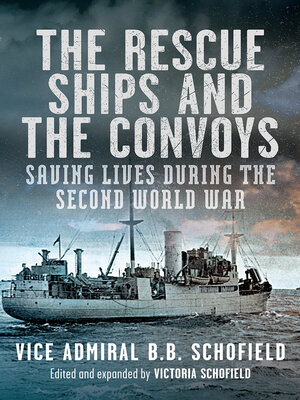
Sign up to save your library
With an OverDrive account, you can save your favorite libraries for at-a-glance information about availability. Find out more about OverDrive accounts.
Find this title in Libby, the library reading app by OverDrive.



Search for a digital library with this title
Title found at these libraries:
| Library Name | Distance |
|---|---|
| Loading... |
The Rescue Ships and the Convoys tells the history of one of the least known aspects of Second World War maritime history. Despite the threat of heavy losses of ships and lives, no hospital ships, which had to be lit, could accompany the convoys as they would betray a convoy’s position.
The solution was to create a fleet of 30 small Merchant Navy vessels of about 1,500 gross tons, mostly from coastal trade. These ‘Rescue Ships’, commanded and manned by Merchant Navy personnel, carried medical teams, and life-saving equipment including operating theaters, hospital beds, ‘Carley’ floats, and hoists.
Undeterred either by either enemy action or atrocious weather conditions, these vessels accompanied close to 800 convoys and saved 4,194 lives from ships sunk in the North Atlantic and with the Arctic convoys. During their service, seven Rescue Ships were lost.
This is a story packed with suspense, danger, achievement and tragedy. As the author, Vice Admiral Schofield, who was closely involved in the establishment of the fleet, writes, it is a record ‘of great humanitarian endeavour, of superb acts of courage, of a display of seamanship of the highest order, of a devotion to duty by medical officers under the most arduous conditions imaginable, of great deeds by men of the Merchant Navy in little ships on voyages they were never designed to undertake.’
The solution was to create a fleet of 30 small Merchant Navy vessels of about 1,500 gross tons, mostly from coastal trade. These ‘Rescue Ships’, commanded and manned by Merchant Navy personnel, carried medical teams, and life-saving equipment including operating theaters, hospital beds, ‘Carley’ floats, and hoists.
Undeterred either by either enemy action or atrocious weather conditions, these vessels accompanied close to 800 convoys and saved 4,194 lives from ships sunk in the North Atlantic and with the Arctic convoys. During their service, seven Rescue Ships were lost.
This is a story packed with suspense, danger, achievement and tragedy. As the author, Vice Admiral Schofield, who was closely involved in the establishment of the fleet, writes, it is a record ‘of great humanitarian endeavour, of superb acts of courage, of a display of seamanship of the highest order, of a devotion to duty by medical officers under the most arduous conditions imaginable, of great deeds by men of the Merchant Navy in little ships on voyages they were never designed to undertake.’







